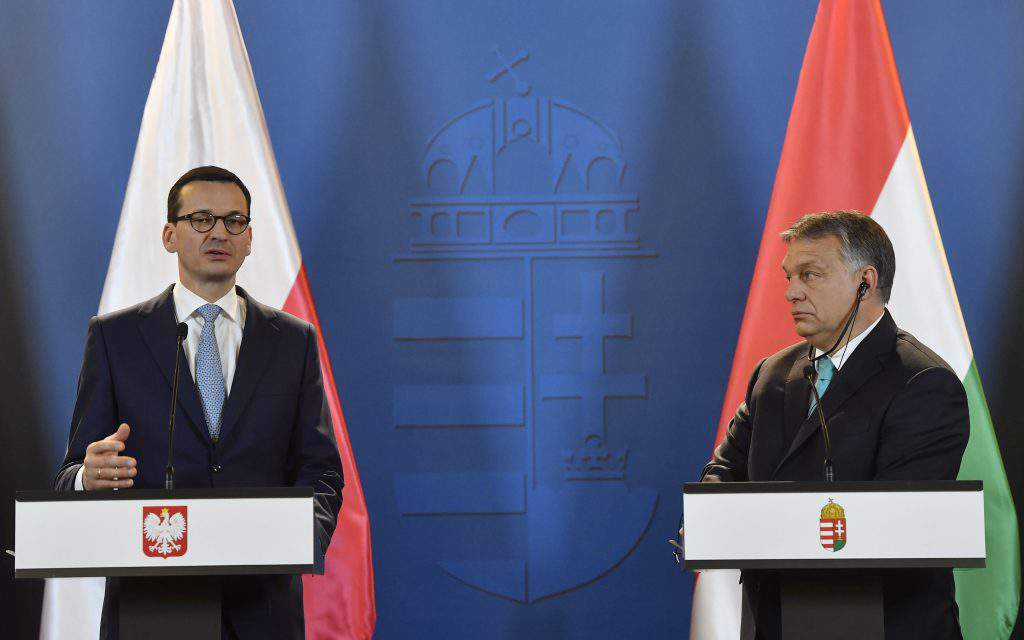Polish PM highlights importance of V4 cooperation – Morawiecki in Budapest

Polish Prime Minister Mateusz Morawiecki in Budapest on Wednesday stressed the significance of Visegrad cooperation. The central European region is a stabilising force in the European Union and it wants to have a say in the bloc according to its weight, Prime Minister Viktor Orbán told a press conference after a meeting with his Polish counterpart.
The four Visegrad countries are important constituents of the European Union, contributing to its economic growth and stability, Morawiecki told.
“We trust in the EU and in its values, and seek to jointly develop it,” he said.
The Polish premier said they completely shared the Hungarian position on the migration crisis.
Citizens of sovereign states have a right to decide with whom they wish to live together, Morawiecki said. He said his country is firmly against any mandatory migrant quotas, and insisted that the European Commission has no authority to introduce such a mechanism. He added that “aid should go where the problem is” and said that his country had contributed to relevant funds.
Morawiecki insisted that more and more European Union members supported Poland’s position and added that “the Austrian example is spectacular”.

Orbán says region wants voice in EU
“While economies in our region are doing well, the EU’s migration policy has failed spectacularly,” Orbán said at the joint press conference.
“We are the European Union’s engine of growth,” Orbán said.
Central Europe is the bloc’s fastest-growing region, “without which we would not even be talking about growth in the EU”, he said.
The prime minister said the borders must be protected and migration stopped. Aid should be delivered to the source of the problem, he added.
The European people do not want immigration, yet certain European leaders continue to force it, Orbán said.
He thanked Poland for its help in protecting Hungary’s borders, saying that by helping Hungary, Poland demonstrated that the protection of the country’s southern border was not a Hungarian domestic issue, but rather a European one.
Cooperation between Poland and Hungary will focus on major projects such as north-south energy and transport infrastructure, he said.
Orbán described his talks with Morawiecki as “excellent”.
The prime minister said 2018 would be an important year for Europe, “the year of great debates”.
Orbán noted that 2018 would be the last full calendar year ahead of the next European parliamentary election. This is why, Orbán said, many in Europe see 2018 as the last opportunity to turn the bloc into a collection of “immigrant countries”. He said the matter would be discussed at the European Council meeting in March.
As regards the “spiritual dimensions” of migration, Orbán said he believed it was inconceivable that Hungary would ever “enter a post-Christian or post-national era”.
The Hungarian community had been kept together through its national identity and Christian culture,
he said, adding that if Hungarians ever had to give this up, the community would fall apart.
Asked about the possibility of expanding the Visegrad Group, Orbán said one of the alliance’s biggest strengths was that its members are bound by their shared histories, culture and level of economic development. Expanding the group would put its effectiveness at risk, the prime minister argued. Orbán added, however, that the group is considering intensifying its relations with Austria.
Orbán said he intends to meet members of Austria’s new government later this month, along with some of the country’s key economic players and key figures in its intellectual life. He said Austria had proven that democracy is working in Europe and that it was inconceivable that in the long run a country’s leaders would not heed the will of voters on important matters, such as migration.
Asked about opportunities for Hungarian-Polish economic cooperation, Orbán said that while neither country wanted to “live off of German money”, they were both happy to accept foreign investment. The prime minister said it had become clear over the past few years that central Europe is capable of standing on its own two feet economically if it gets a chance to trade, invest, work and develop.
Poland is a major economic player in the region, Orbán said, adding that
“those who believe in central Europe” have an interest in a strong Polish economy.
Orbán also said that Germany’s trade volume with the V4 was significantly larger than its trade volume with France. He added that cooperation between Germany and the V4 was at least as important to Europe as French-German cooperation.

“This is the new era. This is the new reality,” the prime minister said, adding that this was why the central European region deserved to have a say in the future of the bloc according to its weight.
[button link=”https://dailynewshungary.com/tag/poland/” type=”big” color=”red” newwindow=”yes”] Read more news about Polish and Hungarian relations[/button]
Asked about Poland becoming a non-permanent member of the UN Security Council, Orbán said Poland represented the unique experience of countries that “fought for and won their freedom with blood”. Poland’s membership is “very important” for Hungary, because it represents central European identity and interests, Orbán said. The prime minister also expressed hope that Poland’s membership would lead to the V4 addressing global security issues.
Source:








Our true brothers(testvérek – bracia) of a few thousand years, fight and party afterwards together to eternity!